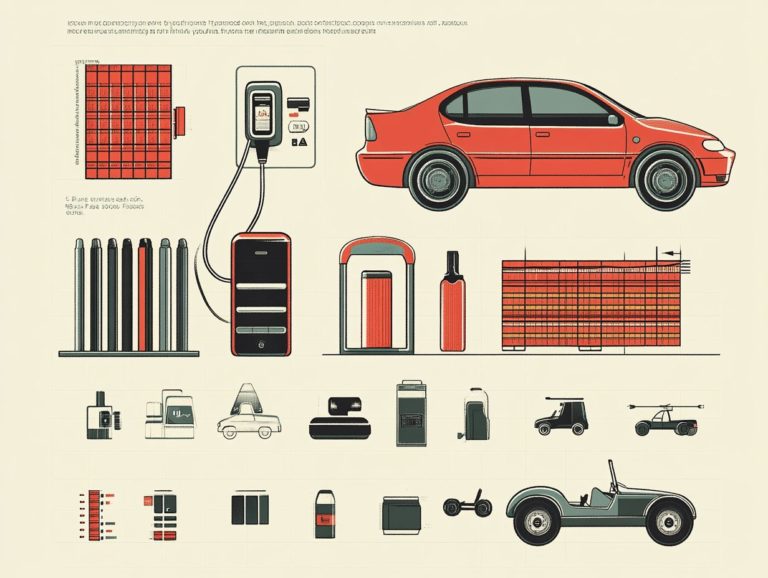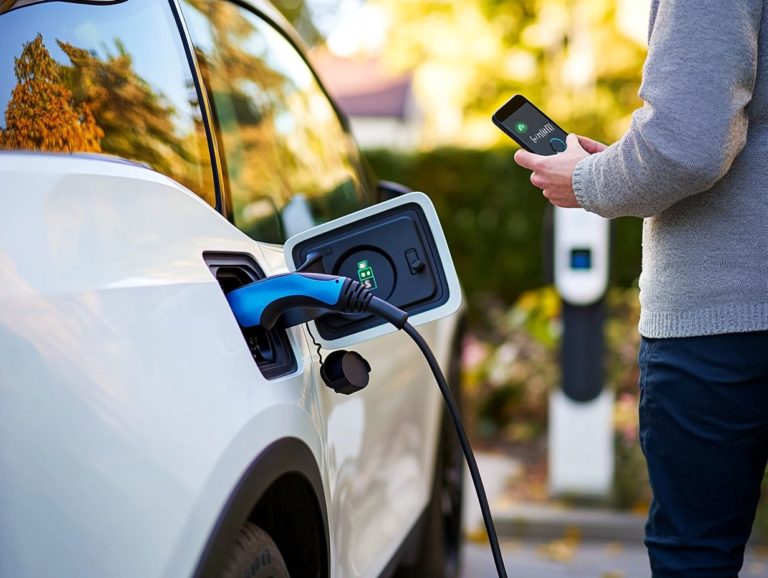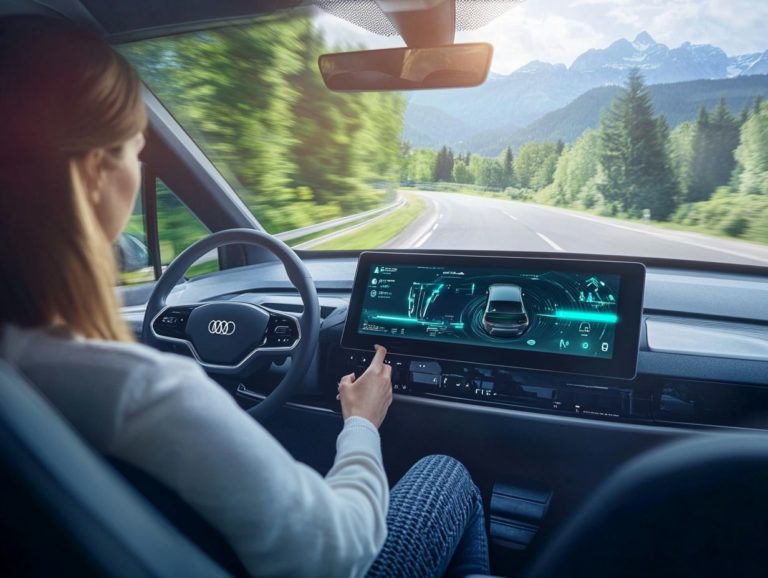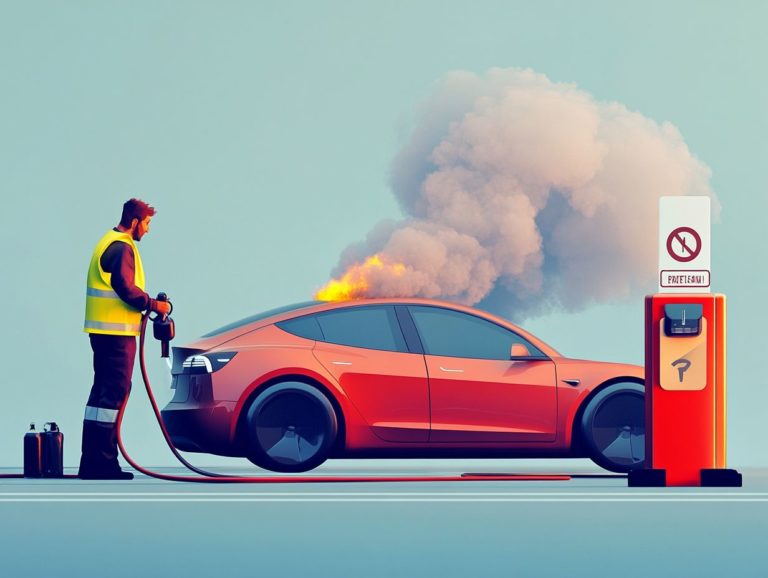how many miles can an electric vehicle travel?
Electric vehicles (EVs) are changing how we think about transportation. They offer eco-friendliness and remarkable efficiency.
A key concern for potential EV owners is range. This refers to how far your electric vehicle can travel on a single charge.
This guide explores various factors that affect range, including battery size, driving habits, and environmental conditions. You ll also learn how to calculate and improve your EV’s range, address challenges like charging infrastructure, and discover advancements in battery technology shaping electric mobility.
Whether you’re considering your first EV or looking to optimize your current one, this guide provides valuable information just for you.
Contents
- Key Takeaways:
- Factors Affecting the Range of Electric Vehicles
- Calculating the Range of an Electric Vehicle
- Improving the Range of an Electric Vehicle
- Limitations of Electric Vehicle Range
- Future of Electric Vehicle Range
- Frequently Asked Questions
- Wondering how far an electric vehicle can take you on one charge?
- What factors can affect how far an electric vehicle can go?
- Can electric vehicles travel the same distance as gas-powered vehicles?
- How long does it take to charge an electric vehicle?
- Do all electric vehicles offer the same range?
- Can you extend the range of an electric vehicle?
Key Takeaways:
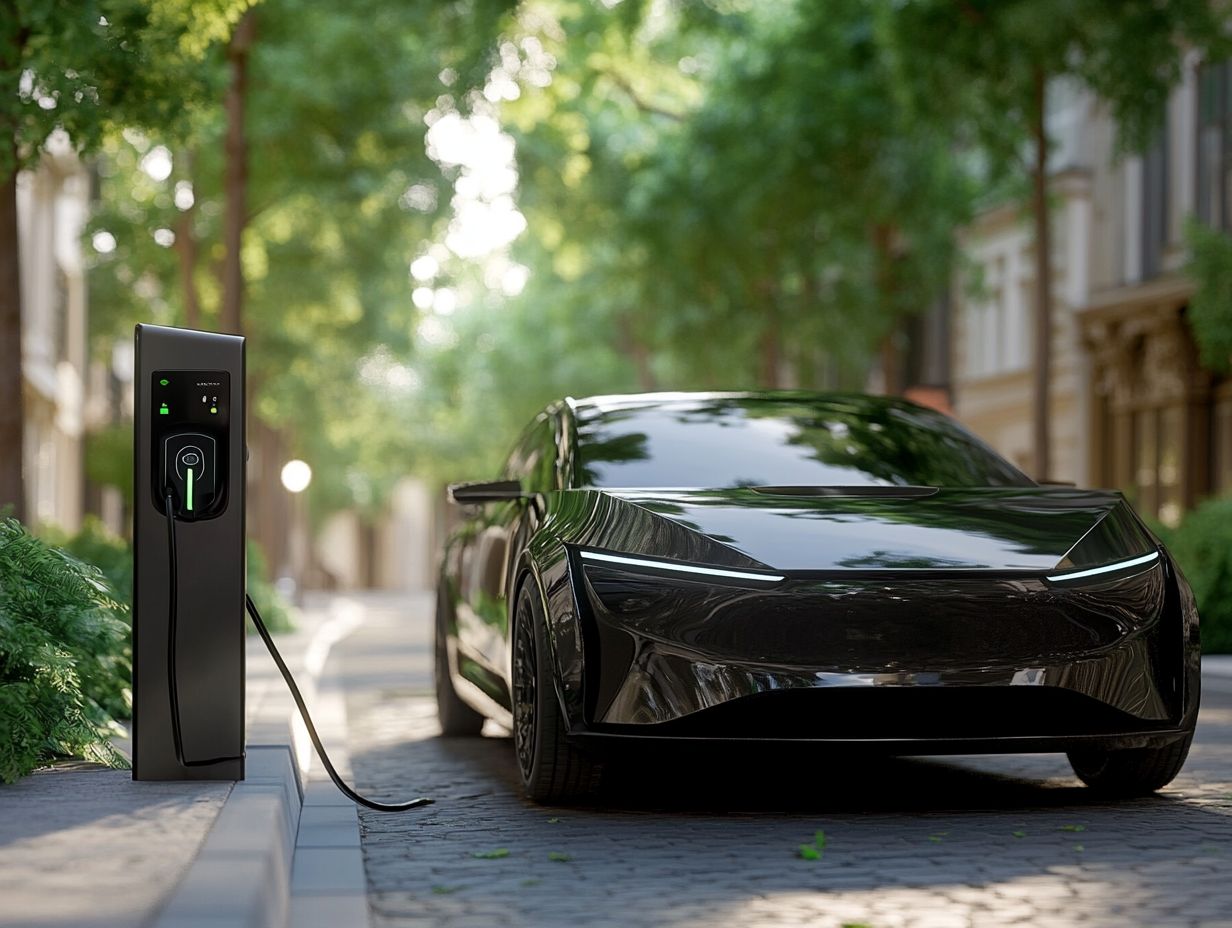
The range of an electric vehicle is influenced by battery capacity, driving habits, and environmental conditions. By calculating your range and adopting efficient driving habits, you can enhance your EV’s performance. Challenges like limited charging options and range anxiety may affect how people adopt electric vehicles.
What are Electric Vehicles?
Electric vehicles (EVs) represent a significant change in personal transport. They use electric motors instead of traditional engines.
This shift is driven by improvements in battery technology and growing consumer interest in energy efficiency.
Models like the Tesla Model S and Nissan Leaf showcase the variety of EVs available today. They cater to different market segments while addressing environmental concerns.
Essentially, electric vehicles cover a range of technologies. Some are fully electric and run solely on battery power, while hybrids combine conventional engines with electric motors for better fuel efficiency.
As environmental awareness rises, more consumers are seeking greener alternatives. This has led to a surge in demand for electric vehicles, pushing manufacturers to innovate continuously.
Brands such as BMW and Ford are making great strides in the EV market, ensuring competitive choices for eco-conscious consumers.
This rapidly changing landscape signifies a crucial moment in transportation history. It suggests a future where electric mobility is key to reducing carbon footprints and reliance on fossil fuels.
Factors Affecting the Range of Electric Vehicles
The range of electric vehicles (EVs) depends on several key factors. These include battery size, your driving habits, and external conditions like weather.
Understanding these factors is crucial as range anxiety remains a challenge for many potential EV owners.
Battery Capacity and Type
Battery capacity and type are vital in determining your electric car’s range. They impact energy usage and your overall driving experience.
Modern EVs use advanced battery technology, such as lithium-ion and solid-state batteries. Each type has different capacities, charging speeds, and lifespans.
The size of the battery directly affects the maximum range of models like the Tesla Model S and Lucid Air Dream. Knowing these details is essential when choosing an electric vehicle.
Some manufacturers are also exploring alternatives like nickel-metal hydride and lithium iron phosphate. For example, lithium iron phosphate batteries are known for their stability and long life, although they usually have lower energy density than lithium-ion batteries.
A robust battery capacity can improve your driving range, allowing for longer trips without frequent recharging. Rapid charging options can also minimize downtime during longer journeys.
As a potential buyer, consider battery degradation over time. A reduction in capacity may affect vehicle performance and range, making it important to consider these factors carefully.
Driving Habits and Conditions
Driving habits and conditions significantly impact the effective range of your electric vehicle, as they directly shape how much energy you use.
Factors like your driving speed, acceleration, and even the use of climate control systems can dramatically influence how far you can go before needing a recharge.
External conditions, such as terrain and weather especially in colder temperatures add another layer of complexity to the relationship between your driving behavior and the vehicle’s range. This makes it crucial for you to adopt efficient driving practices.
If you accelerate aggressively, you’ll find that it leads to higher energy usage. Frequent braking may waste potential energy, particularly in regenerative braking systems designed to conserve power.
Different types of roads, like highways compared to city streets, can also affect your EV s efficiency. Adverse weather conditions, such as rain or snow, often require you to slow down, which can further drain your battery life.
To reduce worries about running out of battery, you should aim to:
- Drive efficiently.
- Avoid rapid accelerations.
- Use eco-driving modes whenever possible to optimize your electric vehicle’s efficiency.
Calculating the Range of an Electric Vehicle
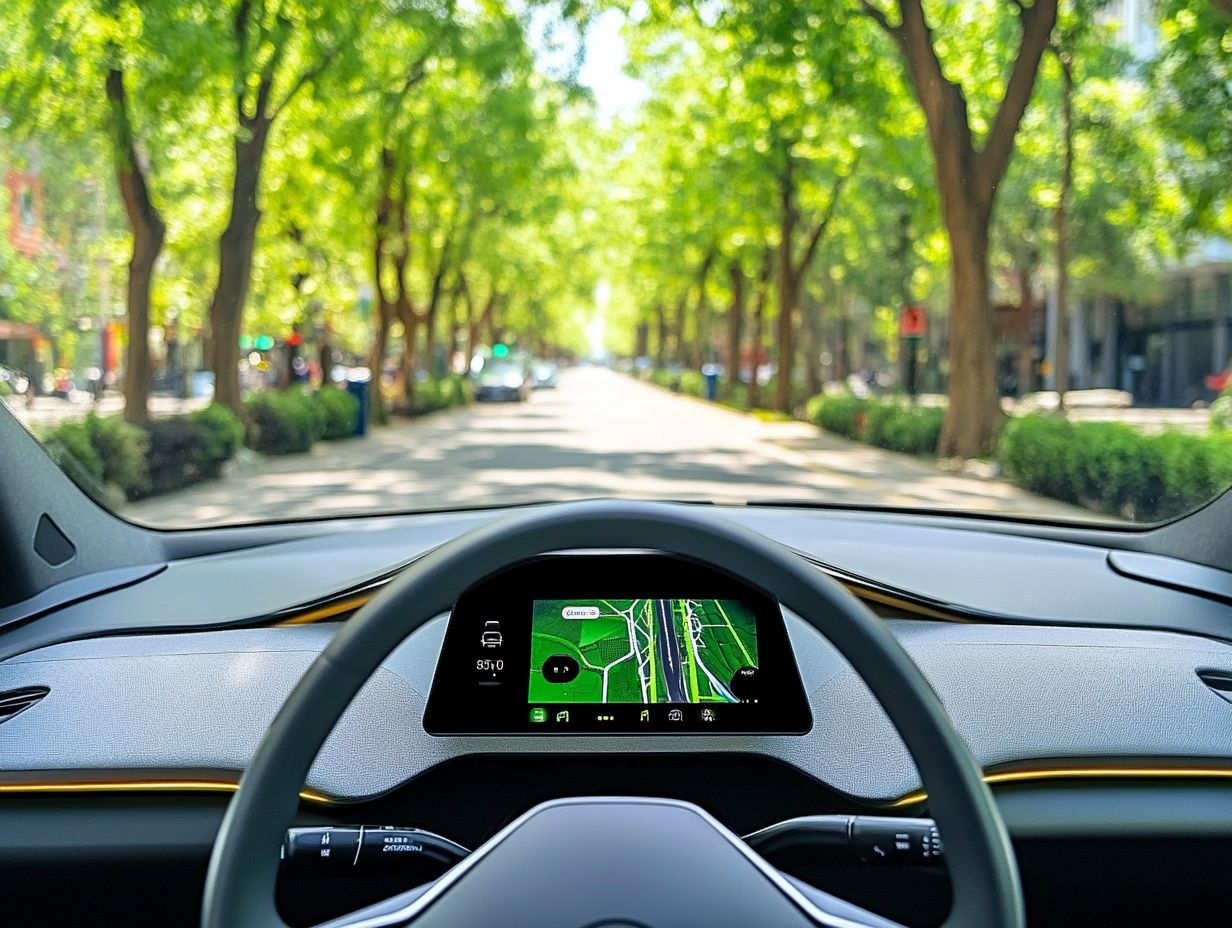
Calculating the range of your electric vehicle requires a grasp of several key metrics, including energy consumption, battery capacity, and the driving conditions you might encounter.
By leveraging metrics such as Driving to Empty (DTE) and factoring in the charging time, you can develop a more precise understanding of how far your EV can travel on a single charge. This insight not only aids you in planning long-distance trips but also enriches the overall ownership experience by alleviating those nagging concerns associated with worries about running out of battery.
Understanding Range Calculations
Understanding range calculations for electric vehicles is crucial for you as a potential buyer or current owner. It enables you to make informed decisions about your transportation needs.
You’ll want to consider factors like energy consumption per mile and variations in speed to accurately predict how far your EV can travel under different driving conditions. Knowing how to interpret manufacturer specifications is key to this analysis.
This understanding goes beyond just crunching numbers; it’s about recognizing how your driving habits, terrain, weather, and even the use of auxiliary systems can affect overall efficiency.
For example, aggressive acceleration or frequent stops can lead to higher energy usage, ultimately reducing your effective range.
Evaluating energy consumption metrics not only helps you in your daily driving but can also play a significant role in your purchasing decision when you’re thinking about which electric vehicle to invest in.
As EV technology advances, being well-informed about these details gives you the power to choose a model that best meets your commuting needs.
Improving the Range of an Electric Vehicle
A variety of strategies can help you extend that range, such as:
- Drive efficiently.
- Use climate control wisely.
- Plan your routes smartly.
By integrating these techniques, you can significantly improve your electric vehicle’s performance and alleviate any worries about running out of battery.
Tips for Increasing Range
There are several effective strategies you can use to enhance the range of your electric vehicle, transforming your daily driving experience.
Drive efficiently by maintaining a steady speed, using regenerative braking a system that helps recharge the battery while slowing down and shedding unnecessary weight. These steps can extend the battery life and overall range of models like the Nissan Leaf and Chevrolet Bolt. By being mindful of your driving behavior and external conditions, you can mitigate range anxiety.
To optimize energy consumption, consider driving at moderate speeds. Heavy acceleration and high speeds can dramatically diminish battery efficiency. It’s also advantageous to switch to eco-driving modes, which adjust your vehicle s performance to prioritize energy savings.
Paying attention to climate control settings can significantly impact your range. For example, using seat heaters instead of heating the entire cabin can help conserve energy. Parking in shaded areas can prevent excessive heat buildup, and pre-conditioning your vehicle while it’s still plugged in are simple yet impactful actions.
These adjustments can greatly enhance your driving range, ensuring a more enjoyable and efficient journey.
Limitations of Electric Vehicle Range
The limitations of electric vehicle range are a significant concern for potential buyers, often playing a crucial role in the decision to embrace this innovative technology.
Key factors contribute to these limitations: insufficient charging infrastructure, variability in battery performance under diverse driving conditions, and the ongoing challenge of range anxiety.
Recognizing these challenges is essential for both you and manufacturers as you navigate the dynamic landscape of electric vehicle technology.
Charging Infrastructure and Range Anxiety
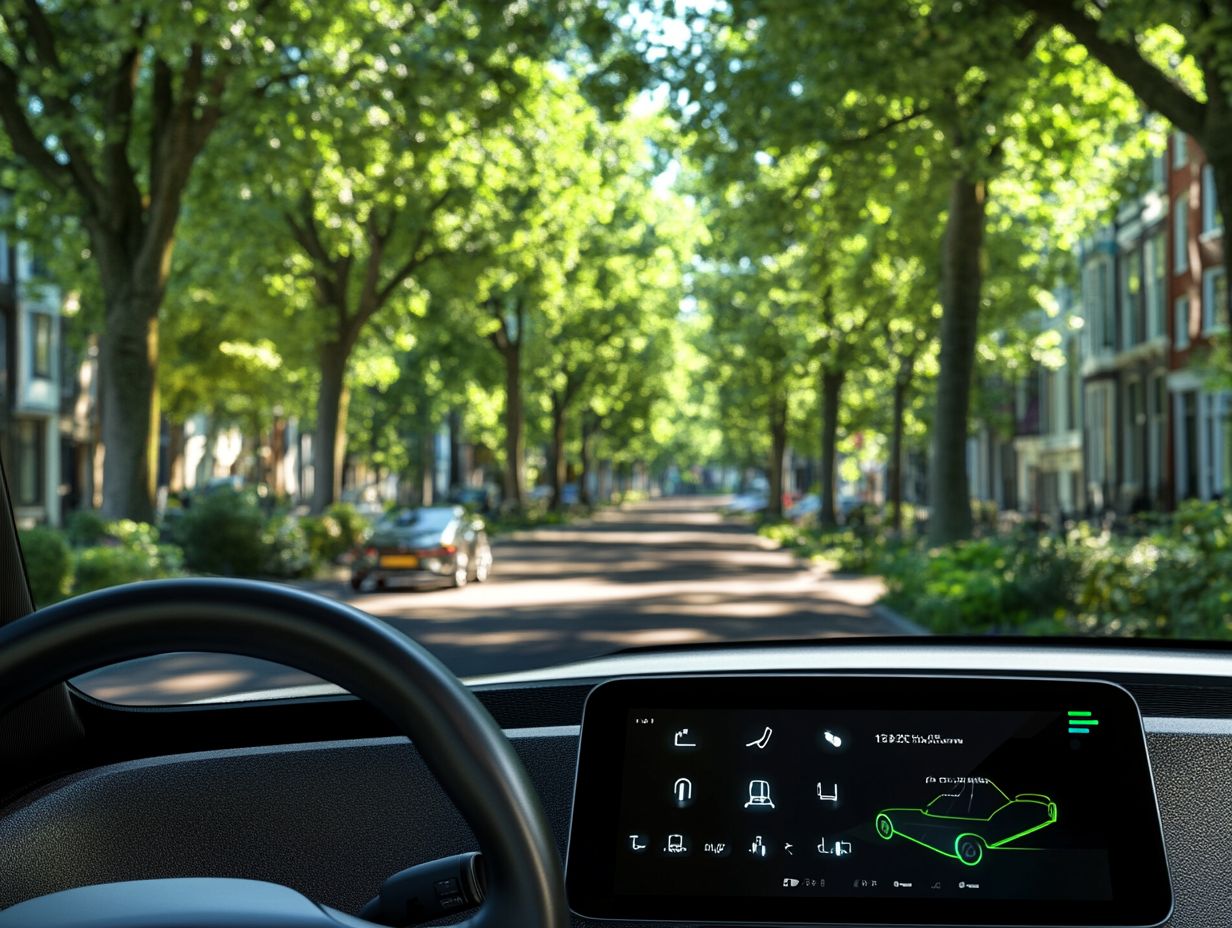
Charging infrastructure is vital for tackling range anxiety, a major hurdle in electric vehicle adoption. We must act quickly to build a robust network of charging stations that eases your worries about running out of battery on long trips.
As more people show interest in electric vehicles, enhancing charging options and accessibility becomes crucial in promoting their use.
Expanding this infrastructure isn’t just about adding more stations; it’s also about diversifying the types available, such as fast chargers and Level 2 chargers, to suit different driving habits.
When you notice more accessible charging points in urban areas, workplaces, and along highways, your hesitations about going electric will likely wane. This improved access influences consumer behavior significantly, leading to higher adoption rates of electric vehicles, as you’ll feel secure knowing you won’t be left stranded without a charging option.
A well-connected charging network encourages electric vehicle use and plays a key role in fostering a more sustainable future.
Future of Electric Vehicle Range
Exciting advancements in electric vehicle technology are on the horizon! Continuous improvements in battery capacity, energy density, and charging speed are set to elevate the maximum range of electric cars, significantly increasing their appeal to consumers.
As these technologies continue to evolve, the prospect of electric vehicles emerging as a dominant force in personal transportation becomes increasingly tangible, paving the way for broader electric vehicle adoption.
Advancements in Battery Technology
Advancements in battery technology are fundamentally reshaping your experience with electric vehicles, significantly enhancing their range and performance.
Innovations like solid-state batteries, which are a new type of battery that is safer and lasts longer, and improved lithium-ion technology are not just increasing battery size and capacity; they re also slashing charging times and elevating overall energy efficiency.
These developments can extend electric cars’ range considerably, addressing common concerns about range anxiety and usability that you might have as a potential buyer.
As manufacturers ramp up their investment in research and development, integrating new materials, such as silicone anodes and advanced electrolyte formulations, promises remarkable improvements. This enhances performance metrics while contributing to a more sustainable manufacturing process.
Your experience with electric vehicles is set to improve dramatically, with faster charging times and longer ranges making them practical for both daily commutes and long road trips.
As costs associated with these cutting-edge technologies decrease, electric vehicles are likely to become more accessible, accelerating the shift toward greener transportation options.
Impact on Adoption and Usage
The advancements in electric vehicle technology are transforming how you will adopt and use these amazing vehicles! These innovations directly tackle many concerns you might have as a potential user.
By enhancing the range of electric vehicles and improving access to charging stations, manufacturers can significantly alleviate range anxiety, making it easier for you to consider electric cars as a viable alternative to traditional vehicles. This shift has the potential to revolutionize personal transportation and promote greater sustainability.
As battery technology continues to evolve, vehicles are now capable of covering longer distances on a single charge, fundamentally changing how you perceive electric cars. Improved charging infrastructure, including fast-charging stations in convenient locations, supports these advancements, ensuring that recharging during longer journeys is a breeze.
The synergy between extended range and accessible charging options creates a compelling case for anyone hesitant to switch from conventional cars. As awareness of these benefits grows, it s likely that more individuals, including you, will embrace electric vehicles, leading to a transformative impact on market dynamics and environmental consciousness.
Frequently Asked Questions
Wondering how far an electric vehicle can take you on one charge?
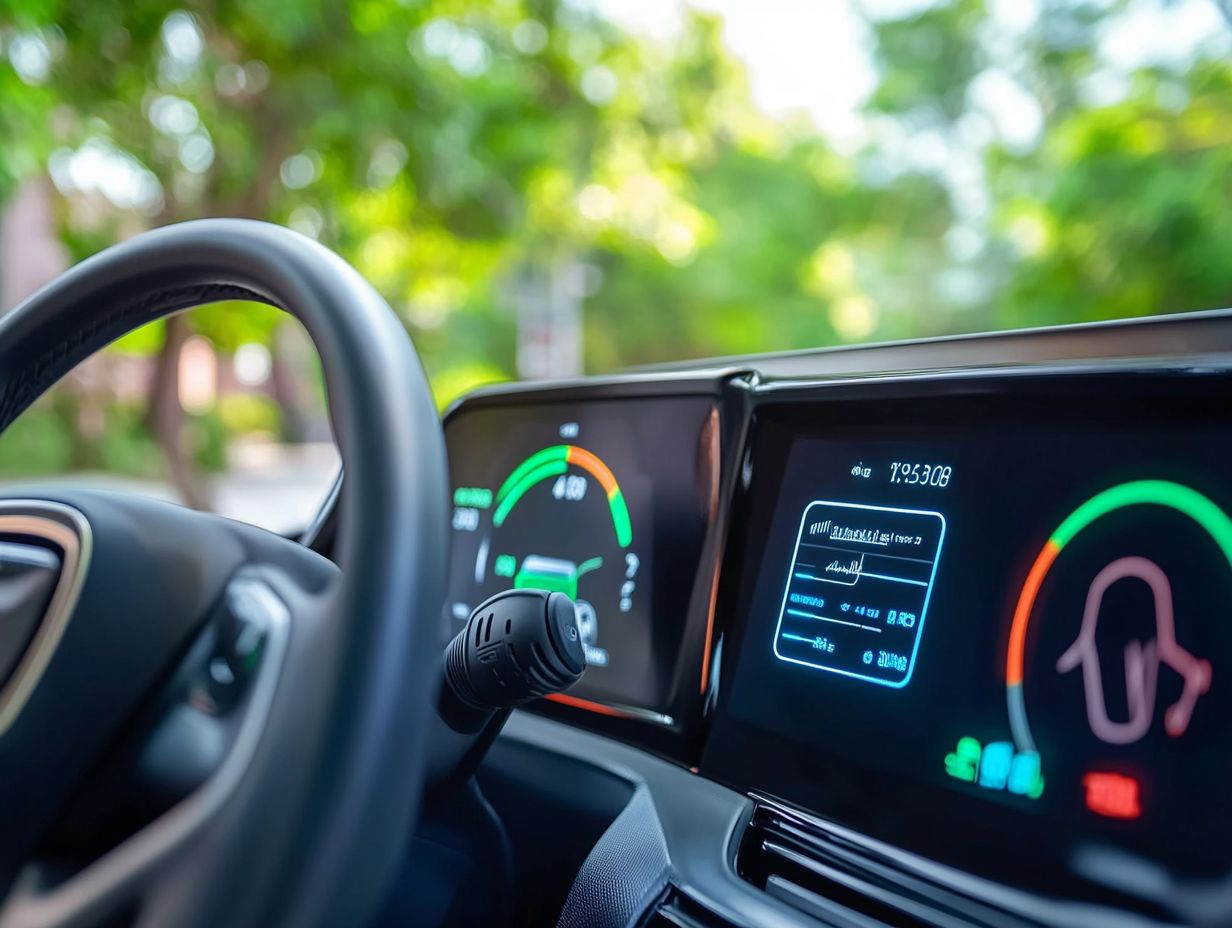
An electric vehicle can typically travel between 100-300 miles on a single charge, depending on the model and battery capacity, which can vary widely. For more information, check out the range of popular electric vehicles.
What factors can affect how far an electric vehicle can go?
The range of an electric vehicle can be influenced by driving speed, terrain, weather conditions, and the use of climate control.
Can electric vehicles travel the same distance as gas-powered vehicles?
While electric vehicles generally have a smaller range compared to gas-powered vehicles, they are continuously improving, and some models can now travel similar distances on a single charge.
How long does it take to charge an electric vehicle?
The charging time for an electric vehicle can range from 30 minutes to 12 hours, depending on the charging method and battery size.
Do all electric vehicles offer the same range?
No, the range of an electric vehicle can vary greatly depending on the model, battery size, and driving conditions.
Can you extend the range of an electric vehicle?
Yes! By utilizing features such as regenerative braking and driving in eco mode, you can optimize energy efficiency and extend the range of an electric vehicle.
Ready to make the switch to an electric vehicle? Discover your options today!


